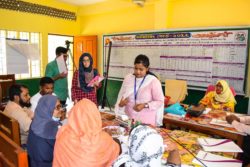Bangladesh PV Pilot
Reflections from the field
Pre-test area selection:
We have selected a village community to pre-test some of the activities of the PV. The name of the village is, Moddhonagar. It is situated in the Chhayfullakandi Union, Bancharampur Upazilla of the district Brahmanbaria.
This place was selected because of the nature of the area. The selected area has rural characteristics as well as it has a vast similarity with our piloting place, Cumilla. So, it was assumed that there would be a similarity between the educational and other characteristics of the population and the participants.
Also, the pre-testing place is a 4-hour drive distance (~66 KM) from the ARK Foundation office. So, it was also convenient for the facilitators to go and forth the place to conduct the sessions every day.
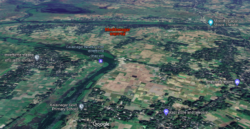
Selection of the participants:
First of all, we have contacted the gatekeepers through one of ARK’s Field Support managers. The field support manager suggested two gatekeepers in the Brahmanbaria District. The gatekeepers provided us with a list of participants after the elaborate discussion. The list consists of 11 members including 5 female participants.
All of the participants are from a diversified social group; some of them are school teachers, and university students, some of them are farmers and local leaders and three of them are community health workers.
We have tried to keep the participant’s backgrounds diversified to make the sessions more participatory and engaging.
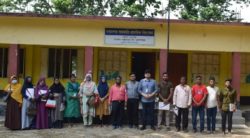
COVID-19 Protocol:
Although there were no guidelines to follow from the government officials during the pre-testing, the team brought face masks and sanitizers to the field and provided to the participants and facilitators as necessary. The participants were asked to inform if anyone feel sick and to sanitize their hand frequently. The facilitators also followed standard COVID-19 protocol by wearing face masks and sanitize hands to avoid any potential spreading.
Date Time and place of pre-testing:
The pre-testing was arranged from 25th April to 27th April 2022 and the sessions started at 10.30 AM and finished by 3.30 PM every day.
The pre-testing was conducted in a local primary school with the permission of the respective authorities. A room was provided by the authority to conduct the sessions.
Pre-testing procedure:-
It is always better to pre-test some of the activities of any intervention or approach to delivering a smooth and sophisticated final product. To keep that in mind, we have selected 8 activities from four workshops.
They are:
- Workshop-1, Activity-1 (Introducing The
- Project) & Workshop-1, Activity-2 (Introducing Filming Equipment And Shooting Professional Looking Footage); to test how community people receive the workshop on Introduction of Camera Equipment and Interview taking
- Workshop-2,
- Activity-1-4; to test how community people react to the workshop games and activities on AMR, what types of challenges and learnings would we get from those workshops
- Workshop-3,
- Activity-2, to test the potential challenges of introducing medicines and establishing shared terms
- Workshop-5;
- Activity 1: Scriptwriting, to test the potential challenges regarding script production from the participants on the issues around AMR with a special focus on ABR
For more information on each activity, please find a full facilitation manual here (link to manual)
Consent from the participants:
An informed consent form was provided to the participants before the sessions and all of the clause and terms mentioned in the form was explained elaborately and clearly upon the request of the participants.
The participants were also given enough time to decide. After that, the participants signed the consent form.
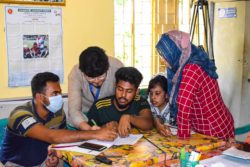
Safeguarding Protocol:
The participants were informed to contact with the COSTAR safeguarding officer through the contact information given in the information sheet if they feel to report or share anything related to the safeguarding issue throughout the sessions.
Feedback
Challenges:
Though all of the participants termed the activities as ‘Engaging’, all of them struggled a lot to get a good grasp on understanding the technical terms ranging from antimicrobials to camera framing. 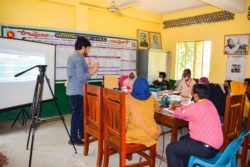
As facilitators, we have also faced problems to deliver the technical terms of antimicrobials to the participants.
In terms of the activity, ‘And So’ activity seemed hard to understand for the participants. They often deviated from the intended path of the story and finished the story. So, in the circle, the same (sometimes a bit modified version of the same story) story was repeated by the participants. The facilitators tried to get the participants back on the track, but not quite successful in that. So, it was challenging for the participants as well as the facilitators.
We have tried to maintain the mentioned time on the manual but we have found it difficult to conduct the workshop within that time. We felt that each activity might require more time and sensitive catering to the participants to make the topic and activity clear and understanding.
We felt that we have chosen too many activities to conduct within three days period. Choosing fewer activities would make the sessions more interactive and participatory (we would obviously keep that in our mind while conducting PV piloting).
We also observed that, throughout the whole process of conducting the sessions, we didn’t put enough emphasis on the One Health perspective.
As the activity was conducted in a school room, there were table and chairs already in the place. The facilitators struggled a bit to place the cameras in place and to move with the camera freely due to short spaces.
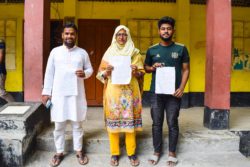
Our Experience
The experience gained from the PV pretesting could be termed as ‘practical’ to the facilitators. When we have provided sessions on different topics on AMR and ABR, they do not have any place for implementation. But, when we started to conduct sessions on participatory video, camera equipment introduction and script-writing workshops, their engagement and attention were heightened to a great extent. As a result, we could determine the effectiveness of our sessions and could gauge their attention and takeaways from the sessions.
The team had selected too many activities, and the whole team felt that, selecting fewer activities in a day would enable both the participants and the facilitators to comprehend and practice the learnings more effectively, while they could have time to relax and digest the new information from the sessions.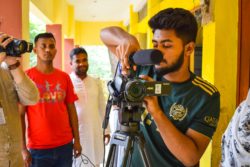
During the activities, some ‘key points’ could be repeated and be put more emphasis so that the participants could get the idea of important issues around AMR and ABR. For instance, putting more emphasis on One Health perspective to tackle antimicrobial resistance could be discussed repeatedly during the different sessions. The facilitators could mention ‘One Health’ word more often during the sessions.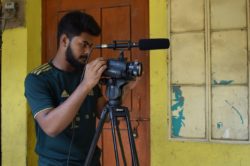
Though the sessions were conducted in Ramadan and in the middle of the summer, while all of the participants and the facilitators were fasting, their participation and engagement were really fascinating. The participants enjoyed the sessions and claimed to learn and gain new perspectives on AMR, ABR from the One Health point.
Overall Reflections
As we never did the activities by our own and it was the very first time, we have done it, so conducting all of the activities as facilitators was also challenging for us. Despite different ups and downs, the team enjoyed conducting the sessions and having a good grip on PV through this pretesting. The valuable suggestions and feedback would make the piloting of PV in Bangladesh approachable and it would help to work around the issues related to AMR in human, animal and environment.
